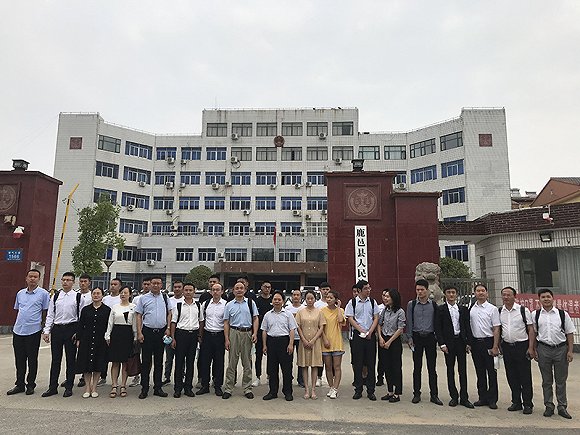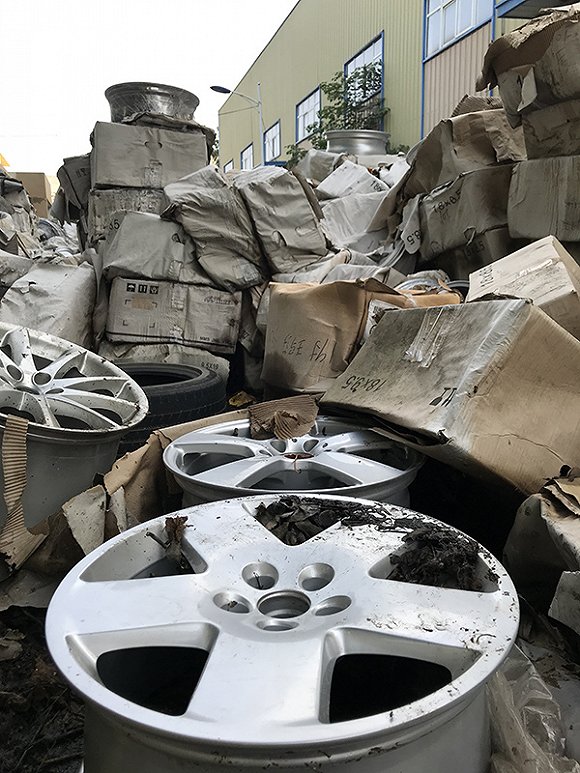China currently has no regulation for production or sale of reconditioned wheel rims, highlighting similar regulatory voids among other recycled or remanufactured items.

The wheel rims reconditioned by Xingyu company. All photos by CAO Linhua
By CAO Linhua
Translated by GU Yiwei
Heading for his office in Henan Province’s Luyi one morning, Shang Dongdong had just stepped out of his front door when he was handcuffed by the police.
Arrest is rarely the beginning of anyone’s troubles but often marks the point when things start to go speedily downhill. In the following days, Shang’s case quickly escalated and expanded. Sixteen employees of his company Xingyu Automotive Recycling Ltd. were also arrested, charged with selling counterfeit products. Among other details, the size of the case - 280 million yuan (US$40 million) - made national headlines in the quiet summer of 2018. This was not a peddler selling knockoff football shirts on an overpass, if proven this would be a landmark IPR case.
As it turned out, the case was not quite as open-and-shut as investigators had supposed.
In April 2019, when the case went to court, Xingyu, Shang and his employees were charged with production and sale of fakes. Prosecutors claimed that since 2016, Xingyu had recycled and reconditioned used wheel rims and sold them as original parts. The money involved also kept falling, from a cheerful, headline-grabbing 280 million yuan to a much less newsworthy 13 million yuan.
Piles of evidence and testimony grew. The case dragged on. Everyone pleaded not guilty, arguing that the charges were without merit. There are no quality standards for wheel reconditioning and no authorization procedure for companies who recycle car parts. On June 17, the court adjourned and the defendants were released on bail. Regardless of the final ruling, the case has drawn attention to a booming automotive recycling sector that has operated according to the whims of recyclers for years.

Shang, once a simple entrepreneur meeting a market need, had been in jail for 700 days when he was bailed. In the deserted Xingyu campus covered in waist-high grass, Shang recalled the warm welcome he received from the Luyi government when he expressed interest in opening a factory in the farming town. He bought 60 acres of a greenfield site and opened Xingyu in early 2016. According to the registration documents, Xingyu “recycles, reconditions, and resells” used parts from abandoned cars, and “develops automotive part reconditioning technology.”
Xingyu was the first company in Henan Province to recondition wheel rims. Shang bought second-hand equipment. He claims it was in perfectly good shape, but became part of the case when prosecutors asserted that second-hand equipment made inferior wheels.
Shang denied everything, resolutely defending the entire wheel-recycling processes and claiming that the factory had adequate quality control.
Xingyu expanded quickly, perhaps through Shang’s prudent management, perhaps by simply meeting demand. In less than two years, he had employed more than 50 people and was processing a thousand wheels a month. The wheels were got through suppliers in Hebei and Shandong provinces and through online ads.
The road ahead for Xingyu was open and inviting, ready for the company to put its foot down. Shang headed east to explore business opportunities and only showed up in Luyi when necessary, until July 2018, when the police moved in and the business ground to halt.
The authorities milked the situation for every drop of news value. Luyi police had “uncovered an underground workshop” that made wheels from scrap and sold them through “back-door channels.” A top brand protection official declared “a major consumer rights victory” that may have saved an incalculable number of lives.
More arrests followed and the case attracted the attention of CCTV, the national broadcaster, which prominently displayed cracks and gouges on recycled wheels piled up in Xingyu’s yard. Luyi police were widely honored for their heroic investigative rigor and diligence.
However as the case proceeded, things became murkier and much less spectacular. The charges changed from selling counterfeit trademarks to production of substandard products. There is a world of difference between stealing IPR and making some dodgy wheel rims. The 280 million yuan was “recalculated” as 30 million yuan, before settling at a paltry 13 million yuan.
Suspicions proliferated as the case proceeded. Exactly how many rims had been seized? Shang told Jiemian that about 2,500 finished products worth 4 million yuan ($570,000) were “missing,” far short of the amount recorded on court documents.

In August 2019, all 17 defendants pleaded not guilty to all charges. Prosecutors accused Xingyu of buying unusable wheel scraps for reconditioning and using subpar equipment and methods. Some of the wheels came from cars damaged in a warehouse explosion. Xingyu’s equipment and procedures were compared to those in Nissan factories, with the claim that the “huge gap” could cause death and serious injury.
The defendants said the wheels were worn when they came in, but that is the nature of recycling and didn’t mean the finished products were defective. Applying the same standards to a world-class car manufacturer and a one-factory operation in a small agricultural town was as mischievous as it was absurd. The factory was safe and the products likewise.
The case revolved around whether Xingyu’s finished rims met quality standards, which would be a relative matter to resolve with the help of industry experts. The court retained several of these experts to evaluate the rims, and it was unanimously agreed that they did not meet quality standards. But the fault was not in the wheel rims, or with Xingyu, but with the standards themselves, or rather their absence. There are no quality standards for reconditioned wheel rims.
In the absence of quality mandates, Xingyu followed the “dynamic balance parameter” widely used in wheel manufacture.
“The lower, the safer,” said Shang. “The international standard is 80. All of our wheels are all below 80. There have never been any questions over the safety of Xingyu wheels.”
Prosecutors also alleged fraud, claiming that terms such as OEM (original equipment manufacturer) in Xingyu’s marketing materials misled buyers. Shang contended that the actual terms and conditions were correct and that any misunderstanding was cleared up during the transaction. A customer service agent told every buyer that the parts were recycled. Xingyu’s records substantiated his claims.
Very few clients were individual drivers. Xingyu’s customers were car repair shops, who could easily tell a reconditioned wheel from a new one. Moreover, the rims were much cheaper than actual OEM parts, sometimes less than a quarter of the price of the original.
The company’s attorneys also argued that the few bad customer reviews that mentioned “counterfeit products” were “one-off, subjective, personal opinions,” and inadmissible.

The case has drawn the automobile recycling industry into a controversial spotlight. The niche market has traditionally operated behind the scenes, until China began to encourage the “circular economy” of recycling and remanufacturing on an industrial scale. In December 2019, it was announced that that automotive recycling should also be “systematically supported.”
Scrap and car recycling have never really had any regulation. Anyone with an idea, a few workers, and basic equipment could set up shop as Shang did. There is no mechanism that controls market entry, production, or quality control, causing an uneven distribution of technology, know-how and market power.
But the automotive sector is only part of the story. Recycling of other machines such as construction and mining equipment or production lines face the same regulatory vacuum. The thriving automotive recycling sector overseas has robust controls and efficient manufacturer-to-recycler channels.
“China puts a lot of emphasis on the recycling of mechanical parts,” automobile analysts Jia Xinguang, told Jiemian News, “but legislation always lags behind innovation.”
Without any established playbook, China is playing catch up. Recyclers and remanufacturers like Xingyu are left largely to their own judgment, Xie explained. Companies should refer to quality standards for new parts, and can resort to the Bureau of Consumer Protection in case of disputes.
Xie said the association was working hard to produce quality assurance standards and confirmed that there was no quality standard for wheels: “There are a lot of parts involved and we simply don’t have time to come up with standards for all of them.”